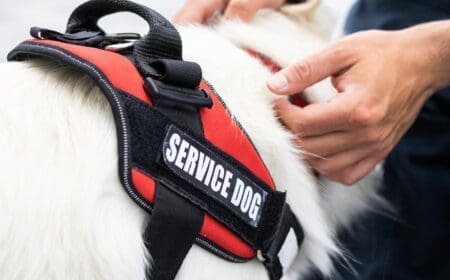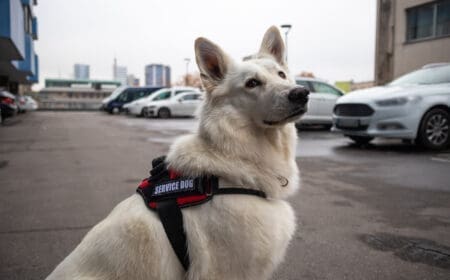There is no one in the world who can love us unconditionally the way our pets do. For many people, getting through the day without the companionship of their emotional support animal can be extremely difficult. That’s why emotional support animal (ESA) laws exist – to make sure that you and your emotional support animal can always be together.
In this article, we will take a look at Vermont emotional support animal laws. We will also cover the benefits of getting an emotional support animal and explain how your pet can become an ESA.
Defining Emotional Support Animal and Their Role
An emotional support animal is any animal that is capable of providing you therapeutic support. It can be any species you can legally keep as a pet, including dogs, cats, ferrets, snakes, rats, and birds.
The purpose of an ESA is to help you cope with the symptoms of your mental health condition. They make you feel less lonely and depressed, and they are always there for you when you feel down.
ESAs, like pets, require their owners to live a fulfilling life. Getting an ESA is a lot of responsibility as you have to feed them on time, take them to the vet for regular check-ups, and ensure their overall well-being. While these are all a responsibility, engaging in your ESA’s life will also deepen your bond and give you a sense of purpose.
You don’t have to go out and get a new ESA. If you have a pet that makes you feel better, then they tick all the boxes to become an emotional support animal. However, you will have to speak to a licensed mental health professional in Vermont and get an ESA letter from them, as it’s a legal requirement.
Getting an ESA Letter
An ESA letter is a signed document given to ESA owners by a licensed mental healthcare professional in Vermont. It explains your mental health condition and how your pet helps you with the challenges associated with it.
Getting an ESA letter may seem like a daunting task, but it’s actually quite easy. All you have to do is get in contact with a licensed mental health practitioner in Vermont.
They will guide you through the process and tell you exactly what you need to do. However, note that not everyone is eligible to get an ESA. Your mental health worker will carefully evaluate your condition and only give you the ESA letter if they believe your pet is a necessary part of your treatment plan.
Eligibility for an ESA
The following are some of the possible mental health problems that can make you eligible to get an ESA letter from your doctor:
- Anxiety Disorders: Conditions such as generalized anxiety disorder, social anxiety disorder, panic disorder, and others characterized by excessive worry, fear, or anxiety.
- Depression: Persistent feelings of sadness, hopelessness, and a lack of interest or pleasure in activities.
- Post-Traumatic Stress Disorder (PTSD): Resulting from exposure to a traumatic event, leading to symptoms like flashbacks, nightmares, and severe anxiety.
- Bipolar Disorder: Involves extreme mood swings, including episodes of mania and depression.
- Panic Disorders: Frequent and unexpected panic attacks, which can be accompanied by physical symptoms such as rapid heart rate and shortness of breath.
- Obsessive-Compulsive Disorder (OCD): Persistent, intrusive thoughts (obsessions) and repetitive behaviors or mental acts (compulsions) to alleviate anxiety.
If your mental health worker thinks you could benefit from an ESA, they will write you an ESA letter. However, it’s worth noting that some states require a 30-day client-provider relationship before an LMHP can write you an ESA letter.
Federal Laws for ESAs
Let’s take a look at the federal laws that affect ESAs and service animals.
Americans with Disabilities Act (ADA)
The Americans with Disabilities Act (ADA) is a federal civil rights law that prohibits discrimination against people with disabilities. It aims to create equal opportunities for people with disabilities and guarantees that they have the same services and goods available to them as everyone else.
People who own service animals are also covered under the ADA. They are allowed to take their service animals to public places like restaurants, schools, hospitals, or even workplaces. It’s important to note that under the ADA, service animals are different from ESAs.
Service animals require specialized training to perform a task for a person with disabilities. As mentioned above, ESAs don’t require any such training as the nature of their work is completely different. Their job is to provide emotional support to their owners.
All businesses have a legal obligation to provide reasonable accommodation to people with service animals. This also includes training their staff to create a welcoming environment for people with service animals.
Any kind of discrimination, including things like changing the service animal owner’s table because of their assistance animal or asking them to take their service animal outside because someone around them is allergic to dogs, is not allowed, thanks to the ADA.
The reason ADA provides so much freedom and protection to service animals is because these animals help their owners with daily tasks and help them overcome challenges related to their disabilities.
They can retrieve objects for blind people, guide people with hearing impairments, and comfort patients when they are experiencing seizures. Not having access to the animal can have troubling consequences, which is why they are given such an exclusive and privileged status.
Air Carrier Access Act (ACAA)
The Air Carrier Access Act (ACAA) is a federal civil rights law that prohibits discrimination against people with service animals. The main difference between this act and the ADA is ACAA’s focus on air travel rights. The ACAA provides a detailed outline for the exclusive rights of service animals during air travel. These include:
- The airline must ensure that there is no discrimination against the owner or the service animal.
- The airline is responsible to provide reasonable accommodation to both the service animal and the owner.
- The airline staff need to be properly trained for onboarding of the owner and the service animal.
- The airline should provide reasonable facilities to the service animal and theowner.
- The airline should create easier access for disabled people during flight (For example, easy access to the bathroom for people with disabilities).
Just like the ADA, the ACAA also doesn’t define ESAs as service animals, which means they can’t travel with you in the cabin of a plane. However, keep in mind that it mostly depends on the airline you choose to fly with, as they all have different policies regarding ESAs.
Most airlines with flights to and from Vermont do allow you to take your ESA with you for air travel as long as you meet their pet travel policies. Also, airlines may charge pet fees for your ESA, and you may need to notify the airline a few days prior to the flight.
Fair Housing Act (FHA)
The Fair Housing Act (FHA) prohibits discrimination against individuals with service animals and ESAs by housing providers, renters, and landlords. The FHA primarily prohibits discrimination against individuals due to their race, gender, nationality, religion, sexual orientation, or disabilities. It is the only federal law that grants protections to emotional support animals.
According to the FHA, a housing provider cannot deny residence to an ESA owner and their pet as long as they have an ESA letter signed by their licensed medical health practitioner. Even if the building has a no-pet policy, the landlord has to make an exception for an ESA. They aren’t allowed to charge extra or any pet deposit because of the ESA.
However, there are some requirements you have to meet in order to get the benefits as listed in the FHA. Your ESA letter could be rejected in the following situations:
- The ESA must not be aggressive towards other people and animals. If the ESA is vicious and known to bite or harm people in any way, the provider can deny your ESA letter.
- If reasonable accommodation cannot be made for the animal. For instance, the landlord can deny the request if the ESA is too large for the property, such as a horse in an apartment.
ESA Laws for Employees and Workplaces
Work can often be very stressful and unforgiving, and repeatedly experiencing pressure and stress can be tough for anyone. These situations are even tougher for individuals suffering from mental health problems. Emotional support animals can greatly help in alleviating that stress.
While the ADA only gives service animals access to workplaces if their presence won’t cause any health or safety risk, ESA owners can also request reasonable accommodation from their employers. They’ll have to show their ESA letter, but there is always a chance that it could get rejected since workplaces have no legal obligation to allow ESAs.
Vermont State’s ESA Laws
Vermont doesn’t have state-specific emotional support animal laws. Therefore, emotional support animals are governed by federal laws, such as the Fair Housing Act. Since ESAs aren’t service animals, they aren’t covered under the Americans With Disabilities Act or the Air Carrier Access Act.
Frequently Asked Questions
Can I Get My Parrot Registered as an ESA?
Yes! Emotional support animals can range from a wide variety of species and don’t necessarily have to be cats or dogs. They can be parrots, birds, or even mice! Since emotional support animals don’t have any mandated formal training, the only metric is if they provide emotional comfort and love.
Can My ESA Registration Turn Into a Service Animal Registration at Any Point?
No, it is not possible to turn your ESA into a service animal. Service animals are legally recognized as a completely different entity. This is because they pass through a rigorous training period, and only dogs (and miniature horses in some cases) can become service animals. ESAs, on the other hand, don’t require any training and must only be good at one thing – making you feel loved and happy.
Do I Need an ID Card for My ESA?
No, there is no need to get an ID card for your ESA since it’s not legally required. You only need an ESA letter for your pet to be legally recognized as an ESA. However, you can still get an ID card if you want. There are various sites online that sell them.
Can My ESA Live With Me in University Housing in Vermont?
Yes, the FHA makes it possible for your ESA to live with you in university housing. You’ll have to show your ESA letter to your university when signing up for a room, and there may be certain restrictions you’ll have to adhere to. Every university has different guidelines, so we recommend that you check the official site of your institution.
Understanding Vermont’s Emotional Support Animal Laws
Emotional support animal laws play a crucial role in acknowledging and safeguarding the connection between individuals and their ESAs. These regulations are designed to make sure that people who have ESAs can live with their pets without any hassle.
To get your pet registered as an ESA, the only thing you need to do is talk to a licensed mental health professional in Vermont and obtain an ESA letter. When moving into an apartment that has a no-pet policy, you’ll be asked to show the landlord your ESA letter. Once the landlord has verified its legitimacy, your ESA can start living with you in your home.
Unfortunately, ESAs in Vermont don’t have the right to accompany their owners to public spaces like restaurants, cafes, schools, and trains. These rights are only given to service animals under the ADA. Nevertheless, your ESA can move in with you in any type of housing, as ESAs are covered under the Fair Housing Act.




